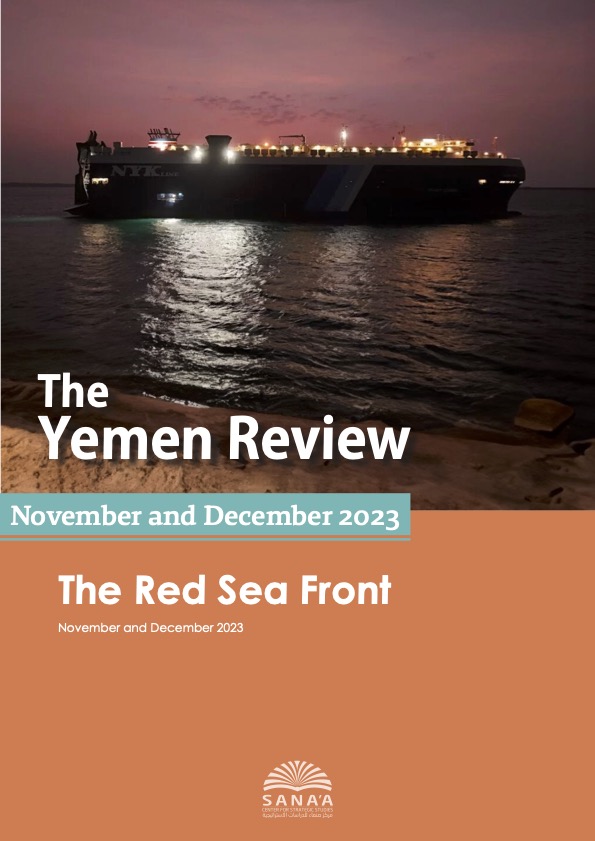Executive Summary
Houthi military action in the Red Sea escalated dramatically during November and December, as the group announced the creation of a ‘third front’ against Israel in retaliation for its war in Gaza and military operations along the Lebanese border. Isolated attacks in October, nominally undertaken in solidarity with the besieged residents of Gaza, have mutated into a sustained campaign, with Houthi leaders now threatening to enforce a blockade of all ships headed to Israel through the area. Dozens of missile and drone strikes against maritime traffic have pushed the major shipping and oil companies to reroute their vessels. The attacks have been a public relations coup for the Houthis, who filmed the dramatic hijacking of the cargo ship Galaxy Leader, and have painted themselves as defenders of the Palestinian people. Regional powers have been hesitant to condemn the attacks, which were occurring near daily as of mid-December.
The response from the US and other Western powers has been cautious. The US has sent additional warships to the region, and the Pentagon announced the formation of an international task force to protect shipping, though the scope of coordination is not yet clear. Mindful of the popularity of the Houthis’ stance, regional states have refused to officially join the response, with the sole exception of Bahrain. But the task force is unlikely to be the final word in the response. The US, Israel, or other Western nations may still launch strikes if Houthi operations continue unabated. At present they show no signs of stopping, and the group continues to work to improve its maritime power projection.
The Houthis have also continued to press on other fronts, launching an attack on Marib in early November. The operation was reportedly the largest in months, and the group has continued to send reinforcements and fortify its positions in the area. Its long-held interest in the governorate’s strategic oil fields does not appear to have abated. The Houthis have also intensified military action in southern Hudaydah, perhaps looking to extend their maritime reach toward the Bab Al-Mandab Strait.
A Saudi-Houthi deal, which seemed imminent through much of November, now appears to be on hold. The scale and brazenness of Houthi attacks have given US and Saudi officials pause, even if they still wish for a settlement to be completed. With further military action likely, and the scale of the international response not yet clear, the Houthis’ position vis-à-vis the peace process and the internationally recognized government is now less certain. Should they or the Saudis abandon peace talks, Yemen could face renewed military contestation between the Houthis and their opponents. For its part, the UN Special Envoy’s office announced its continued support for the process.
The declining prospects of a deal, which reportedly promised massive Saudi financial relief in the form of public sector salary payments, has further imperiled the cash-strapped internationally recognized government. Saudi assistance promised to the government in August has not arrived, and the Houthis’ Red Sea attacks have dramatically increased already high shipping costs, which are passed on to consumers. The country is particularly vulnerable to such fluctuations as it relies almost entirely on imported foodstuffs, and the economic harm from Houthi operations will be felt most intensely in Yemen. Nearing bankruptcy, the government may no longer be able to pay salaries in the new year. It has already suspended FX auctions to finance basic commodity imports, and with its hard currency reserves exhausted, the value of the new rial has been falling since October. The government’s options to raise revenues are limited. A proposal to sell discounted oil to an Emirati company drew intense backlash, though it is unclear what other avenues are available. The government’s insolvency is perhaps most visible in its inability to provide electricity to the interim capital of Aden. The UAE sent an emergency fuel shipment in November to keep power plants running as an interim measure, but a long-term solution remains elusive.
This issue of the Yemen Review was prepared by (in alphabetical order): Murad Al-Arefi, Ryan Bailey, William Clough, Casey Coombs, Yasmeen Al-Eryani, Andrew Hammond, Abdulghani Al-Iryani, Yazeed Al-Jeddawy, Maged Al-Madhaji, Elham Omar, Hussam Radman, Ghaidaa Al-Rashidy, Miriam Saleh, Maysaa Shuja Al-Deen, Lara Uhlenhaut, Ned Whalley, and Wadhah Al-Awlaqi.
The Yemen Review is a monthly publication produced by the Sana’a Center for Strategic Studies. Launched in June 2016 as Yemen at the UN, it aims to identify and assess current diplomatic, economic, political, military, security, humanitarian, and human rights developments related to Yemen.
In producing The Yemen Review, Sana’a Center staff throughout Yemen and around the world gather information, conduct research, and hold private meetings with local, regional, and international stakeholders in order to analyze domestic and international developments.
This series is designed to provide readers with contextualized insight into the country’s most important ongoing issues.


 اقرأ المحتوى باللغة العربية
اقرأ المحتوى باللغة العربية

